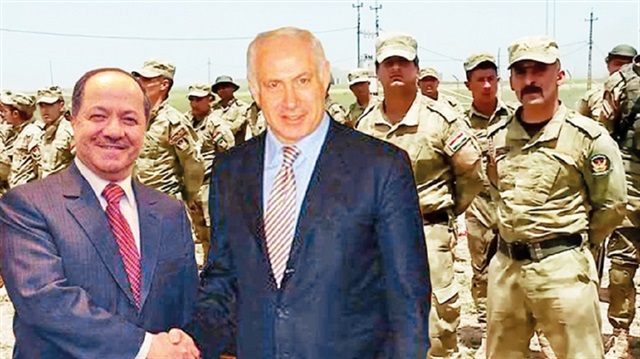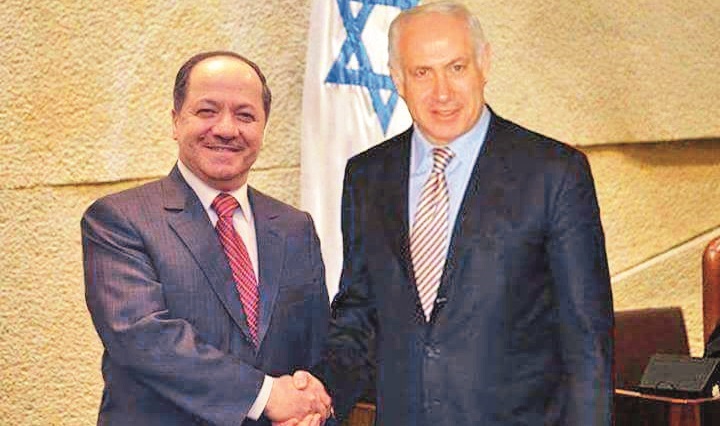
A regional map plotted by Israel is due to take its final form through the PKK-Barzani partnership following the Sept. 25 referendum
The terror corridor formed by the Barzani- Kurdistan Worker’s Party (PKK) partnership, which is openly supported by the Israeli authorities, is being built on promised territories that Zionism founder Theodor Herzl referred to as "holy as Palestine."
Dr. Hicran Kazancı, the Iraqi Turkmen Front Representative in Turkey, said that Barzani and his son had deeply-established connections in Tel Aviv, and that Barzani and the PKK would be used as garrison power in the region with the formation of a state.
Kazancı stated that the region stretching from Mendeli to Tal Afar that has 13 large Turkmen settlements and has been the homeland of Turkmens for over a 1,000 years was being occupied. Kazancı also added that over 500,000 Turkmens who lived in this region had left Iraq.
“Since 2003, the Turkmen region has been a victim of systemic exploitation by global powers,” Kazancı said.
The Turkmen Front representative pointed out the significant proliferation of the plans to divide Syria and Iraq plotted by Israel in the 1980s.
The economic infrastructure of the illegitimate state, which is trying to establish itself in three regions, is being built on oil, said Kazancı.
"The Barzani government, which produced 200,000 barrels of oil per day in Erbil, has its eyes on Kirkuk. Kirkuk has a production capacity of 550,000 barrels per day, and Israel and the U.S. want Barzani to be in control. Kirkuk’s status is regarded as the greatest dispute between the Iraqi central government and Barzani,” Kazancı said.

The Iraqi Parliament has made clear statements about Barzani and the Sept. 25 referendum. The parliament in Baghdad authorized the prime minister on Tuesday to "take all measures" to preserve Iraq's unity.
Barzani invited Jews who migrated from Iraq in the early 1900s to return. Jews will be positioned in regions emptied of Arab and Turkmen communities, just as it is in Palestine, under the so-called united terrorist state that will be established in cooperation with Barzani and the PKK.
Parallel to the eastern and northern regions of Syria and the ethnic-based separatist state initiatives in the north of Iraq, the Israeli front is also active. During the last three months, the Greek Cypriot community conducted one of the largest military exercises in the history of Israel in the Najaf Desert and the Golan region, on the border of Lebanon from Sept. 4-7.
It is reported that the Israeli-US and regional allies are in preparation for a comprehensive intervention on the Lebanon-Sham-Baghdad-Tehran line.
Israeli Prime Minister Benjamin Netanyahu reiterated his support for the establishment of a garrison affiliated with themselves in the region. "By rejecting all sorts of terrorism, Israel supports the legitimate efforts of the Kurdish people to obtain a state of their own," Netanyahu said in remarks sent to foreign correspondents by his office.
"Israel rejects the PKK and sees it as a terrorist organization," the statement added.
The statement came after former Israeli Chief of General Staff Maj. Gen. Yair Golan said he did not consider the PKK to be a terrorist organization. Golan expressed his support of the PKK during a conference in Washington last week.
"From my personal point of view the PKK is not a terrorist organization, that's how I see it," Golan said.
The PKK -- designated as a terrorist organization by Turkey, the U.S. and the EU -- has waged a terrorist campaign against Turkey for more than 30 years, during which more than 40,000 people have been killed.
The group is also involved in illicit drug manufacture and trafficking.
In July of 2015, the PKK resumed its armed campaign against Turkey. Since then, it has been responsible for the death of some 1,200 Turkish security personnel and civilians including children.
KRG political parties who support the referendum have resorted to establishing a regional parliament in order to grant the poll rejected by the Iraqi parliament a legitimate status. The parliament, which has not convened for two years due to the political crisis, is opening today for the referendum debate.
Mela Bahtiyar, the Politburo Officer of Kurdistan Patriotic Union (KYB), said the Democratic Party of Kurdistan (KDP) and the Gorran (Change) Movement reached an agreement in principle in order to open the parliament.
The Gorran Movement is known for its opposition to the timing of the referendum and its stance against the decision taken without consultation under the parliamentary framework.
Hello, the comments you share on our site are a valuable resource for other users. Please respect other users and different opinions. Do not use rude, offensive, derogatory, or discriminatory language.
The floor is all yours.
















